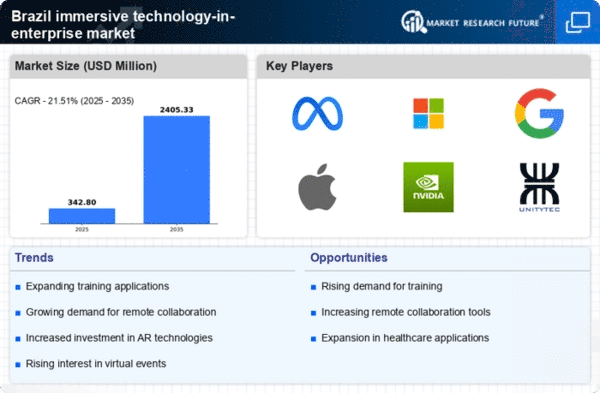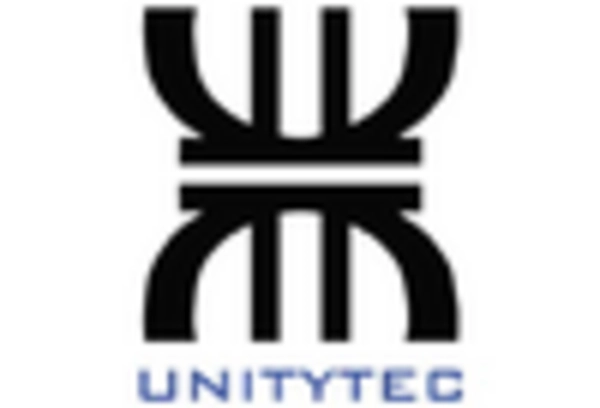Emerging Applications in Marketing and Sales
The immersive technology-in-enterprise market is witnessing emerging applications in marketing and sales, particularly in Brazil. Companies are leveraging immersive technologies to create interactive and engaging marketing campaigns that capture consumer attention. For example, AR applications allow customers to visualize products in their own environment before making a purchase decision. This innovative approach has been shown to increase conversion rates by up to 20%. As businesses recognize the potential of immersive technologies to enhance customer engagement and drive sales, investment in these solutions is expected to rise. The immersive technology-in-enterprise market is thus likely to expand as organizations explore new ways to connect with consumers and differentiate themselves in a competitive landscape.
Growing Demand for Remote Collaboration Tools
The immersive technology-in-enterprise market is experiencing a notable surge in demand for remote collaboration tools. As organizations increasingly adopt hybrid work models, the need for effective virtual collaboration solutions has become paramount. In Brazil, companies are investing in immersive technologies to facilitate seamless communication and teamwork among remote employees. This trend is reflected in a reported 30% increase in the adoption of virtual reality (VR) and augmented reality (AR) tools for collaborative purposes. Such technologies not only enhance productivity but also foster a sense of presence among team members, thereby improving overall engagement. The immersive technology-in-enterprise market is thus positioned to benefit significantly from this growing demand. Businesses seek innovative ways to maintain connectivity and collaboration in a distributed work environment.
Increased Investment in Digital Transformation
The push for digital transformation across various sectors is significantly impacting the immersive technology-in-enterprise market. Brazilian companies are increasingly recognizing the value of integrating immersive technologies into their operations to enhance customer experiences and streamline processes. A recent survey indicated that 40% of enterprises in Brazil plan to allocate a portion of their digital transformation budgets to immersive technologies over the next two years. This investment is expected to drive innovation and improve competitive advantage, as businesses adopt immersive solutions for marketing, training, and product development. Consequently, the immersive technology-in-enterprise market is poised for growth as organizations seek to modernize their operations and meet evolving consumer expectations.
Rising Focus on Employee Training and Development
The emphasis on employee training and development is becoming a critical driver for the immersive technology-in-enterprise market. In Brazil, organizations are increasingly utilizing immersive technologies to create engaging and effective training programs. The ability to simulate real-world scenarios through VR and AR allows employees to gain hands-on experience without the associated risks. Reports suggest that companies implementing immersive training solutions have seen a 50% improvement in knowledge retention among employees. This focus on enhancing training methodologies is likely to propel the growth of the immersive technology-in-enterprise market, as businesses strive to equip their workforce with the necessary skills to thrive in a rapidly changing environment.
Advancements in Hardware and Software Capabilities
Technological advancements in hardware and software are driving the growth of the immersive technology-in-enterprise market. In Brazil, the development of more powerful and affordable VR and AR devices has made these technologies more accessible to businesses of all sizes. For instance, the introduction of lightweight headsets and user-friendly software platforms has lowered the barriers to entry for companies looking to implement immersive solutions. This trend is evidenced by a 25% increase in the number of enterprises utilizing immersive technologies for training and development purposes. As hardware and software continue to evolve, the immersive technology-in-enterprise market is likely to see further expansion, enabling organizations to leverage these tools for enhanced operational efficiency and employee engagement.
















